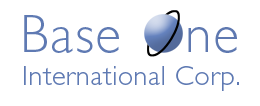 Base One's patented Internet Server allows interactive and batch applications
to be unconcerned with
database location. The Internet Server acts as a transparent
"proxy" for the actual database server, receiving messages to
execute database operations, and sending messages back with database results.
This enables applications to perform information storage and retrieval
using the same syntax regardless of database location.
Base One's patented Internet Server allows interactive and batch applications
to be unconcerned with
database location. The Internet Server acts as a transparent
"proxy" for the actual database server, receiving messages to
execute database operations, and sending messages back with database results.
This enables applications to perform information storage and retrieval
using the same syntax regardless of database location.
Simply by being programmed with BFC's database API, Windows
applications automatically gain the ability to operate on any remote
database that has BIS on its LAN. Database I/O is programmed just as
it would be for traditional client/server applications that use local
databases, but the application can also operate against databases
across the Internet - without any change to the code. BIS and database
applications can run on any regular Windows client or server computer. Typically the Internet Servers are installed inside a secure room, along with web servers and the database servers handling the actual database I/O.
|
As a further precaution, programmers can easily add custom security modules to the Internet Servers and remote applications, so that
their TCP/IP traffic is automatically encrypted. (Examples of custom encryption are included in the sample projects.)
In any case, whatever the physical arrangement of servers and regardless of the location of the client
application, no additional multi-tier programming is necessary.
Executing database calls through BIS also eliminates the need for
DBMS client software to be installed on client workstations or application servers. Once an application
uses the Database Library for all of its database access, no vendor-specific database client software
is required on that computer - only regular TCP/IP messaging capabilities. If a
database is on the same LAN as an application, then the standard database
communication drivers can be used, but these are not required if an Internet
Server is also available on the LAN. A standard TCP/IP connection for Internet or intranet communication is all an application needs to send database requests and receive responses.
Since applications can do efficient, secure database access without direct database connectivity, risky transmission of database passwords
can be entirely eliminated.
|


 Base One's patented Internet Server allows interactive and batch applications
to be unconcerned with
database location. The Internet Server acts as a transparent
"proxy" for the actual database server, receiving messages to
execute database operations, and sending messages back with database results.
This enables applications to perform information storage and retrieval
using the same syntax regardless of database location.
Base One's patented Internet Server allows interactive and batch applications
to be unconcerned with
database location. The Internet Server acts as a transparent
"proxy" for the actual database server, receiving messages to
execute database operations, and sending messages back with database results.
This enables applications to perform information storage and retrieval
using the same syntax regardless of database location.
